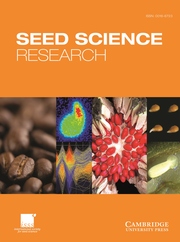Article contents
Characterization of a dual plant protein kinase (FsPK1) up-regulated by abscisic acid and calcium and specifically expressed in dormant seeds of Fagus sylvatica L.
Published online by Cambridge University Press: 22 February 2007
Abstract
An abscisic acid (ABA)-induced cDNA fragment encoding a putative protein kinase (PK) was obtained by differential screening of a cDNA library from Fagus sylvatica seeds. The full-length clone, named FsPK1, was produced by 5′ rapid amplification of cDNA ends (RACE) extension. This clone contained the 11 catalytic domains present in all protein kinases, but displayed unusual characteristics found only in a few plant PKs. FsPK1 exhibits features of both serine/threonine and tyrosine protein kinases within the catalytic domain, a putative nuclear localization signal within the regulatory domain and the consensus sequence involved in binding of 14-3-3 proteins. The catalytic domain, expressed in Escherichia coli as a fusion protein, showed Ca2+-dependent in vitro kinase activity and dual serine/threonine and tyrosine specificity. Transcription of the FsPK1 gene was reduced by seed stratification at 4°C, and clearly increased when seeds were treated with 0.1 mM ABA, correlating with the inhibition of germination. Interestingly, FsPK1 transcripts were enhanced when ABA (0.1 mM) and calcium (1 mM) were added together, while the addition of EGTA (calcium chelator) and 3,4,5,-trimethoxibenzoic acid 8-(diethylamino) octyl ester (TMB-8, a calcium antagonist) decreased its expression. Furthermore, FsPK1 transcript expression was tissue specific and accumulated only in ABA-treated seeds, but not in any ABA-treated vegetative tissues examined. These results suggest that the expression of the corresponding protein could be related to the inhibition of germination mediated by ABA in a calcium-dependent pathway.
Information
- Type
- Research Article
- Information
- Copyright
- Copyright © Cambridge University Press 2003
References
- 6
- Cited by

